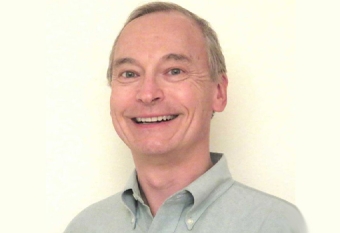
Prof. Chris Van de Walle, a distinguished professor of materials at UC Santa Barbara, has been awarded the American Physical Society’s 2025 Aneesur Rahman Prize for Computational Physics, the highest honor given by APS for work in that field. The prize, which dates back to 1993, honors Aneesur Rahman, a founder of the field of molecular dynamics who pioneered computational methods for modeling physical systems.
“I was overjoyed to learn I had been selected to receive the Rahman Prize,” said Van de Walle, an elected member of the National Academy of Engineering and a fellow of APS, the Institute of Electrical and Electronics Engineers, the American Association for the Advancement of Science, the Materials Research Society, and the American Vacuum Society. “The past recipients of the prize are scientists whom I greatly admire and who have had a major impact on physics, and I feel deeply honored to join their ranks.
Van de Walle performs computational work to develop a fundamental understanding of the physics and chemistry of materials in order to improve existing materials and discover new ones. His work on interfaces has assisted generations of semiconductor physicists in designing novel heterostructures, and his methodologies have helped guide the development of devices such as transistors and lasers, and recently the structures that underlie novel qubits. His research group’s approaches in the area of point defects have also been adopted by researchers throughout the world in a range of applications, from developing better materials for fuel cells to overcoming efficiency limits in light-emitting diodes. APS selected Van de Walle for the Rahman Prize in recognition of his “development and application of first-principles methods for computing the structural, electronic, and optoelectronic properties of point defects and interfaces.”
“Throughout my career, I’ve placed an emphasis on identifying research areas that would meaningfully impact new technologies, and the prize is a wonderful affirmation that this investment has paid off,” said Van de Walle, who has been identified in the top one percent of his field based on citations and been named a Highly Cited Researcher by Clarivate Analytics in six of the past seven years, a reflection of the sustained impact of his group’s research.
Interestingly, the “defects” that used to be viewed as detrimental to materials have recently emerged as functional elements in quantum information science, and the techniques developed in Van de Walle’s group are now employed to analyze and design cutting-edge quantum sensors and single-photon emitters.
“We are extremely proud of Professor Van de Walle, and we congratulate him on receiving this prestigious and well-deserved recognition,” said Umesh Mishra, dean of UCSB’s College of Engineering. “The Rahman Prize serves as a testament to his ability to identify and help solve critical challenges to technological applications, and it further demonstrates the global impact that his first-principle techniques and computational research have made.”
Van de Walle acknowledged the contributions of many people, including mentors, such as Richard Martin and Sokrates Pantelides, to the work recognized by the award.
“I greatly benefited from working with many excellent postdocs and students; they should also share in the recognition bestowed by this Prize,” said Van de Walle, who received a prestigious Vannevar Bush Faculty Fellowship in 2022 from the Department of Defense, a $2.5 million award to study the processes that limit the efficiency of light-emitting diodes, lasers, and other optoelectronic devices. “I am also very grateful to the Materials Department, the College of Engineering, and the UC Santa Barbara campus for providing a supportive and stimulating environment for fundamental computational research.”
Van de Walle noted further that his career has been enabled by the welcoming atmosphere he encountered when he arrived in the United States from Belgium as a graduate student back in 1982. “I strongly feel that maintaining an open door is essential to the success of the United States as a leader on a global scale,” he said.



